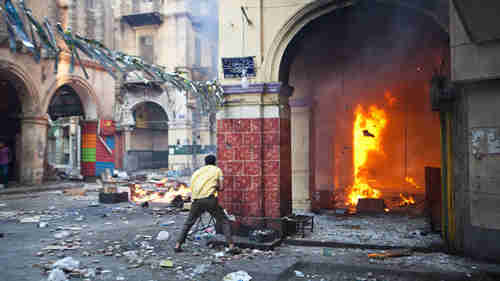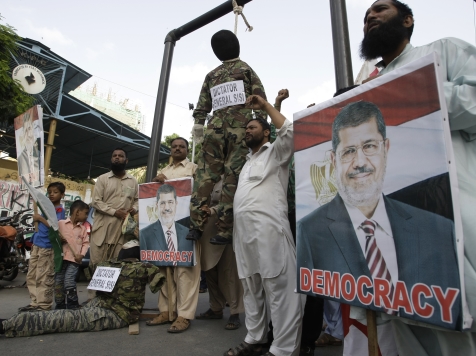
This morning’s key headlines from GenerationalDynamics.com
- A relatively quiet day in Cairo – only 36 deaths
- More on the Generational Dynamics analysis of Egypt’s crisis
A relatively quiet day in Cairo – only 36 deaths

Downtown Cairo on Friday (AFP)
Sunday was a relatively quiet day in Egypt, after a week of clashesbetween security forces and Muslim Brotherhood (MB) supporters thatresulted in almost 1,000 deaths. The Muslim Brotherhood called offseveral planned protest marches on Sunday, rather than risk additionalclashes with the police. The major event of the day occurred when atleast 36 Muslim Brotherhood supporters were killed by security forcesin a gunfight when they tried to escape from a prison convoy as theywere being transported to jail. Al-Jazeera
More on the Generational Dynamics analysis of Egypt’s crisis
I received a couple of inquiries about the statement I wrote yesterday that “A full-scalecrisis civil war is a real possibility in Egypt.” I was unclear inwriting this sentence. I was not attempting to predict a civil warbetween Muslim Brotherhood (MB) supporters and their opponents. I wasonly attempting to contrast Egypt, where a crisis civil war is apossibility, with Syria, where a crisis civil war at this time isdefinitely not.
The reason for the inquiries is that the statement appeared tocontradict my recent article, “28-Jul-13 World View — Generational Dynamics analysis of the crisis in Egypt” in which I wrote, “So my prediction is thatthere will NOT be a civil war between pro- and anti-Morsidemonstrators.”
This is still my prediction, though it’s worth pointing out that Imake this kind of prediction with “only” 80-90% probability. Myrecord on making predictions in the last ten years has been the bestin the world, and I still challenge anyone to find a journalist,analyst, web site or politician with anything close to the predictivesuccess of Generational Dynamics. (For more on the mathematics behindGenerational Dynamics forecasting, see my 2009 paper: “International business forecasting using System Dynamics with generational flows.” (PDF))
So let’s look more closely at the situation in Egypt, and see if it’sreasonable to expect a crisis civil war between the members of theMuslim Brotherhood, versus their opponents.
In order to have a crisis civil war, the country has to be in agenerational Crisis era (which Egypt is, and Syria is not). And therehas to be a hard fault line that separates the two groups that will befighting each other.
What do I mean by a “hard fault line”? The major criterion is thatyour membership in each of the conflicting groups is decided at birth,and there’s no way, in most cases, to “switch sides.”
So, for example, the American Civil War was found along a geographicfault line that separated the North from the South, and in thosedays it was rare for Northerners and Southerners to mingle.
The 1994 Rwanda civil was fought between two ethnic groups — theHutus and Tutsis. In that war, a man might get up in the morning,grab a machete, go to his neighbor’s house next door, kill anddismember the men and children, rape the wife, and then kill anddismember her. That’s the kind of thing that happens in a crisiscivil war.
In the Bosnian civil war of the early 1990s, there were both ethnicand religious differences between the Christian Serbs and the MuslimCroats. In her book, World on Fire, here’s how author Amy Chuadescribes the Bosnian war:
“In the Serbian concentration camps of the early1990s, the women prisoners were raped over and over, many times aday, often with broken bottles, often together with theirdaughters. The men, if they were lucky, were beaten to death astheir Serbian guards sang national anthems; if they were not sofortunate, they were castrated or, at gunpoint, forced to castratetheir fellow prisoners, sometimes with their own teeth. In all,thousands were tortured and executed.”
In Burma (Myanmar) today, you can easily see a full-scale crisis civilwar building between the Buddhists and the Muslims. (See “5-Apr-13 World View — Meiktila, Burma, violence has echoes of Kristallnacht”.) That’s goingto explode into a major bloodbath before too much longer.
Now, I just don’t see anything like that building between the pro- andanti-MB Egyptians. Except for isolated incidents, I don’t expect tosee masses of pro-MB Egyptians raping and mutilating and dismemberingmasses of anti-MB Egyptians, or vice-versa. The fighting andmassacres so far has still been mainly between civilians and securityforces, not between civilians and civilians.
A web site reader sent me a link to a Feb 2012 article that talks about a supposed American-Zionist plotto partition Egypt into four separate countries. I read through thearticle, hoping to find some evidence that there were significant hardfault lines within Egypt that might lead to such a partitioning, butit turned out that the accusations were just fatuous nonsense, as faras I could tell.
One might argue that there are hard fault lines between Egyptians onthe one hand and Jews and Coptic Christians on the other hand, butexcept for isolated incidents we’ve seen little animosity betweenthese groups. The one hard fault line that I’ve seen is with Bedouinsin Egypt’s Sinai.
And that’s why I predict, with 90% probability, that there will not bea full-scale crisis civil war between pro- and anti-MB Egyptians. I’mwilling to change my mind, but only when I see something significant,such as what’s going on in Burma.
Permanent web link to this article
Receive daily World View columns by e-mail

COMMENTS
Please let us know if you're having issues with commenting.